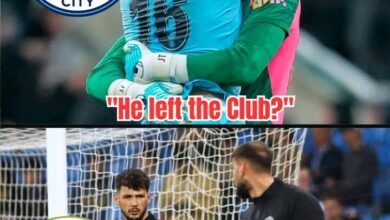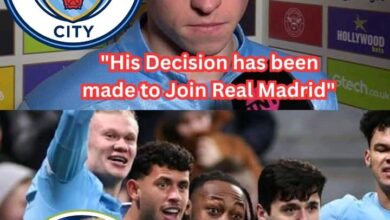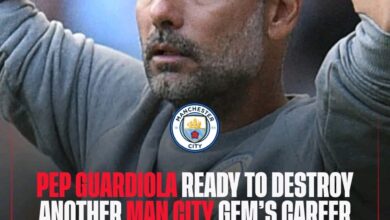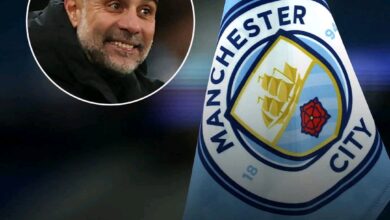Arne Slot slammed for chaotic tactics and clueless game plan: ‘Get him out before we’re relegated’

It was another dark and painful night at Anfield, a place that once felt untouchable, where dreams used to live and fear used to grip visiting teams. But this time, it was different. It was strange. It was heartbreaking. Liverpool fell again, this time to Manchester United, in a 2-1 defeat that left fans speechless, furious, and broken inside. The noise that once made Anfield shake was replaced by boos, disbelief, and confusion. Four straight defeats now, four moments that cut deep into the hearts of Liverpool fans who have seen enough of pain in recent weeks. And the man at the centre of it all, Arne Slot, stood helpless on the touchline as the final whistle blew. His tactics, his selections, his ideas—everything was under fire. Fans were not holding back anymore. Social media was a battlefield, and Slot was the target.
It all began with his team sheet. Many expected Slot to make some bold changes after recent defeats, but no one predicted this. Hugo Ekitiké, the striker many fans wanted to see start after his bright display in training, was left on the bench. Florian Wirtz, the creative magician who could unlock any defence, was also benched. Instead, Milos Kerkez and Conor Bradley were brought into the starting lineup, two young defenders tasked with stopping United’s fast wingers. It looked risky. It looked brave. But in football, bravery without balance can be deadly—and that’s exactly what happened. Within two minutes, Liverpool were already behind. Bryan Mbeumo, wearing United’s red shirt, burst down the flank with freedom no player should ever have inside Anfield. Bradley was caught too high, Kerkez was pulled inside, and Mbeumo punished them with a calm finish that silenced the Kop. Just like that, Slot’s plan began to fall apart.
The reaction from the crowd said it all. Heads dropped. Fans could not understand what they were watching. It wasn’t just the goal—it was the way Liverpool were playing. The 4-2-4 formation Slot used was open, unbalanced, and chaotic. It left the midfield empty, the defence exposed, and the forwards isolated. Manchester United didn’t even need to work too hard. They just waited, attacked the spaces, and controlled the game in ways Liverpool used to dominate others. Every misplaced pass, every defensive error, every wrong run from a red shirt added more frustration. By the 15th minute, chants of confusion began to echo. It wasn’t anger at first—it was disbelief. The fans were trying to process what they were seeing.
But disbelief turned into anger as the minutes went by. Liverpool’s passing rhythm was gone. The pressing that once made opponents fear them was gone. Everything looked disorganised. Even the players looked confused, as if they weren’t sure what they were meant to do. At the sidelines, Slot shouted instructions, waving his arms, pointing, demanding energy—but the more he screamed, the worse it got. Manchester United looked composed and confident. Erik ten Hag’s men were patient and calm, moving the ball around as if they were playing at home. The contrast was clear—one team had a plan, the other was lost in chaos.
Social media was already burning with comments before halftime. Fans on X couldn’t believe what they were watching. One user, LFCBlaze, summed it up in one furious post: “Slot’s 4-2-4 was brain-dead! He’s butchering our season—sack him!” The message spread quickly. Thousands of replies, retweets, and angry emojis followed. Some said Slot had learned nothing from the last three defeats. Others said his stubbornness was destroying the club. A few even compared him to the dark days before Klopp, when tactics were weak, players were lost, and the club had no direction. The mood online was as heavy as the silence inside Anfield.
By halftime, Liverpool were chasing shadows. The midfield pairing of Mac Allister and Endo looked exhausted, pulled apart by United’s trio. Without Wirtz’s creativity, the attack was blunt. Without Ekitiké’s movement, Darwin Núñez looked frustrated, running without support. Fans were hoping Slot would fix it in the second half. They wanted change, they wanted passion, they wanted something to believe in. But when the players came out for the second half, nothing changed. The same eleven, the same system, the same confusion. And soon, the same pain returned.
United doubled their lead from another simple move down the right side. Again it was Mbeumo, again exploiting the full-back area, cutting in to set up Marcus Rashford for the second goal. The Anfield crowd went silent. The boos began slowly, then grew louder. Slot stood still, frozen. His plan had failed again, in front of the home fans who once believed he would bring a new era of energy and brilliance. For a moment, you could see it in his eyes—he knew he had lost the people.
Liverpool tried to fight back. They managed a goal through Diogo Jota after a scrappy rebound, but it wasn’t enough. It wasn’t convincing. It wasn’t Liverpool. The fire that used to burn inside this team, the rhythm that used to make Anfield roar, it was all missing. And when the final whistle came, it wasn’t just the end of the match—it felt like the breaking point of something deeper.
After the game, fans poured out of the stadium with faces full of frustration. Some argued outside the gates. Some stayed quiet. Some blamed the players, others blamed Slot. “He doesn’t understand this club,” one fan shouted near the Kop. “You can’t come here and destroy our identity!” Another replied, “It’s not just him, the players look lost too.” But one thing united them all—everyone agreed something was wrong.
The post-match interviews didn’t help. Slot looked tired, his voice calm but empty. He spoke about needing patience, about rebuilding confidence, about staying positive. But the fans weren’t in the mood for positivity. Four losses in a row is not something Liverpool supporters accept easily, especially at Anfield. The club’s reputation is built on pride, on belief, on fighting spirit. To lose four times in a row, and to do it in such a disorganised way, was unforgivable to many.
X, Instagram, and fan forums exploded all night. Hashtags like #SlotOut and #AnfieldCrisis began trending. People shared screenshots of the lineup and questioned every choice. “How can you bench Wirtz when you need creativity?” one fan wrote. “Why play two strikers with no supply?” another added. Some fans even shared edited pictures of Klopp smiling, with captions like “We never knew what we had until it was gone.” It was emotional, raw, and brutal.
Inside the dressing room, reports suggested tension. Some players were said to be unhappy with Slot’s tactics, especially the constant formation changes. Others felt the team had lost its identity. One insider reportedly said, “We don’t know what we’re playing anymore. One week it’s 4-3-3, next week 4-2-4, then it changes mid-game. It’s confusing.” If that is true, then Slot’s problems are bigger than just a few bad results. He might be losing control of the dressing room too.
The board, for now, is said to be calm, but the pressure is real. Four defeats in a row, fans turning against you, and performances dropping—those are warning signs no manager can ignore. Even if the club wants to back Slot, the noise outside is getting too loud. Anfield is a place of love, but when it turns against you, it can feel colder than anywhere else.
The truth is, Slot’s ideas might be good on paper, but they don’t fit Liverpool yet. The 4-2-4 system requires balance, discipline, and understanding between players, and Liverpool don’t have that chemistry right now. The full-backs push too high, the midfield gets exposed, and the defence suffers. United’s first goal showed everything wrong with the setup—no protection, no communication, no structure. In modern football, small mistakes become big punishments, and Liverpool are learning that the hard way.
But still, deep inside, some fans are trying to stay hopeful. They remember Klopp’s early days, the struggles before the success. They know change takes time. But patience has limits, and Slot is running out of it fast. The next few games could decide everything. If he doesn’t find a way to stop this collapse, his Liverpool dream might end before it ever truly begins.
Liverpool’s identity has always been about fight, passion, and connection between players and fans. That bond is now shaking. Slot’s challenge isn’t just tactical—it’s emotional. He needs to win back trust, rebuild belief, and remind the players what it means to wear the red shirt. Because right now, they look like strangers wearing something they don’t understand.
Back on X, the reactions kept coming through the night. “We play like a mid-table team,” wrote one angry fan. “Even Burnley looks more organised!” Another added, “He turned Anfield into a training ground for United.” Some even called for Steven Gerrard to return, while others joked about bringing back Klopp for one last run. It showed how desperate the fans have become.
Every Liverpool fan knows defeat happens in football. But this one felt different. It wasn’t just losing—it was losing identity, losing control, losing belief. Manchester United didn’t just beat Liverpool; they exposed the cracks that were already there. They showed that Liverpool are in transition, and transitions are painful when results don’t come.
When Slot walked off the pitch, he barely looked up. The cameras followed him, showing his face as he walked down the tunnel. You could almost read the thoughts in his mind—questions, regrets, maybe even fear. He knows the Liverpool job isn’t just about tactics. It’s about emotion, history, and spirit. And right now, he’s failing to capture all three.
The lights went off at Anfield that night, but the noise didn’t stop. Talk shows, podcasts, YouTube channels—all were filled with debates about what went wrong. Everyone had an opinion. Some said the players weren’t good enough. Others said Slot’s system doesn’t work in England. But one point united them all: Liverpool have lost their way, and Slot must find it again before it’s too late.
For the fans, this pain runs deep. They have watched their team rise from the bottom to the top under Klopp, only to now feel like they are falling back into confusion. The fear of becoming ordinary again is haunting them. They want to believe in Slot, but belief must be earned, not demanded.
As the week goes on, eyes are already on the next match. Will Slot change his approach? Will he bring back Wirtz and Ekitiké? Will he fix the full-back problem that has cost Liverpool again and again? No one knows yet. But one thing is certain—the next game is not just about points. It’s about survival, pride, and redemption.
And so, in the heart of Anfield, the storm continues. The fans are angry. The players are confused. The manager is under fire. Four straight defeats have turned Liverpool’s season into chaos. The same fans who sang his name now doubt his vision. The same man who came to bring hope now finds himself fighting to keep it alive.
In football, everything changes fast. One win can bring joy. One loss can bring crisis. For Arne Slot, this 2-1 defeat to Manchester United may go down as the night that tested everything—his ideas, his courage, and his place in Liverpool’s history.
For now, all he can do is look at the mirror, look at the team, and look at Anfield—the place where heroes are made or broken. Because right now, after another night of pain, the message from the fans is clear: fix it, or face the music. And somewhere on X, that one angry post still echoes the mood of millions—
“Slot’s 4-2-4 was brain-dead! He’s butchering our season—sack him!” It is harsh. It is emotional. But it is also the reality of football at Liverpool—a place where passion never sleeps, and failure never hides.















